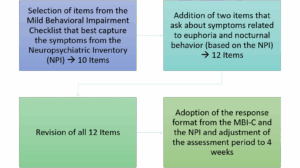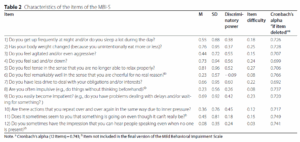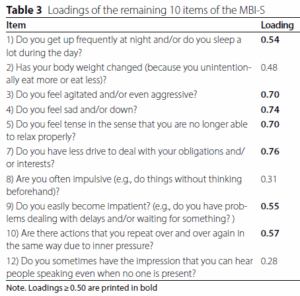Here you can find all the information on the construction and validation of the Mild Behavioral Impairment Scale (MBI-S). If you have any further questions or suggestions, please do not hesitate to contact us.
Item Construction
The MBI-S was developed and validated in four steps by Hinkl et al. in 2025:

During the validation of the scale, four items were removed due to insufficient psychometric or factor-analytic fit. The final version of the MBI-S thus consists of eight items.
The validation of the MBI-S was based on a sample of 175 clinically unremarkable individuals. The participants were between 18 and 89 years old (M = 59.6, SD = 14.5). 69 % of the participants were women, 66 % were married, and 82 % lived with another person in a household.
The internal consistency of the 12-item version was examined by computing Cronbach’s alpha. Cronbach’s alpha for the 12-item version was .743. The discriminatory power of the items ranged from – .09 to .60. Cronbach’s alpha (if item deleted) ranged from .692 to .766. Due to insufficient psychometric properties (low discriminatory power and Cronbach’s alpha if item deleted was greater than Cronbach’s alpha with the item), two items (Items 6 and 11) were classified as unsuitable.

A principal component analysis was then performed on the remaining ten items. The Kaiser-Meyer-Olkin criterion was .81. Three components had eigenvalues greater than 1.0. The scree plot and Horn’s parallel analysis confirmed the one-factor solution. Since Items 8 and 12 had insufficient factor loadings of well below .50, these two items were also classified as unsuitable.

The final version of the MBI-S consists of the following eight items:
| 1) Do you get up frequently at night and/or do you sleep a lot during the day? |
| 2) Has your body weight changed (because you unintentionally eat more or less)? |
| 3) Do you feel agitated and/or even aggressive? |
| 4) Do you feel sad and/or down? |
| 5) Do you feel tense in the sense that you are no longer able to relax properly? |
| 6) Do you have less drive to deal with your obligations and/or interests? |
| 7) Do you easily become impatient? (e.g., do you have problems dealing with delays and/or waiting for something?) |
| 8) Are there actions that you repeat over and over again in the same way due to inner pressure? |
You can register to download the scales here.
The internal consistency of the MBI-S (final eight-item version) resulted in a Cronbach’s alpha of .79.
Validity was tested and confirmed on the basis of four hypotheses (Hinkl et al., 2025):
Convergent Validity:
- H1: Because the MBI-S and MBI-C (Mild Behavioral Impairment Checklist, Ismail et al., 2017) were developed to measure the same construct, the two scales were expected to be positively correlated at a high level (r = .80 with p = .002).
- H2: A positive correlation between the MBI-S and maladaptive coping captured by the Brief COPE was expected (r = .32 with p = .002).
- H3: A positive correlation was expected between the MBI-S and the Three-Item Loneliness Scale (Hughes et al., 2004) (r = .52 with p = .002).
Discriminant Validity:
- H4: No relationship between the MBI-S score and educational level was expected (r = -.06 with p = .504).
Hinkl, P., Graessel, E., Rohleder, N., Landendoerfer, P., Kuehlein, T., Lauer, N., & Pendergrass, A. (2025). Validation of the Mild Behavioral Impairment Scale (MBI-S) for brief self-assessment of Mild Behavioral Impairment in people without dementia. Annals of General Psychiatry, 24(1), 1-13.
Hughes, M. E., Waite, L. J., Hawkley, L. C., & Cacioppo, J. T. (2004). A short scale for measuring loneliness in large surveys: Results from two population-based studies. Research on Aging, 26(6), 655-672.
Ismail, Z., Agüera-Ortiz, L., Brodaty, H., Cieslak, A., Cummings, J., Fischer, C. E., … & NPS Professional Interest Area of the International Society of to Advance Alzheimer’s Research and Treatment (NPS-PIA of ISTAART). (2017). The Mild Behavioral Impairment Checklist (MBI-C): a rating scale for neuropsychiatric symptoms in pre-dementia populations. Journal of Alzheimer’s Disease, 56(3), 929-938.
Mild Behavioral Impairment Scale (MBI-S); Mild Cognitive Impairment (MCI); Mild Behavioral Impairment (MBI)
